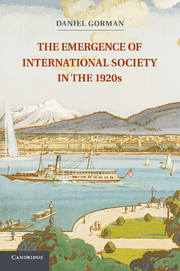Crossref Citations
This Book has been
cited by the following publications. This list is generated based on data provided by Crossref.
Grant, Kevin
2013.
The British Empire, International Government, and Human Rights.
History Compass,
Vol. 11,
Issue. 8,
p.
573.
Gorman, Daniel
2014.
Organic Union or Aggressive Altruism: Imperial Internationalism in East Africa in the 1920s.
The Journal of Imperial and Commonwealth History,
Vol. 42,
Issue. 2,
p.
258.
Little, Branden
2014.
An explosion of new endeavours: global humanitarian responses to industrialized warfare in the First World War era.
First World War Studies,
Vol. 5,
Issue. 1,
p.
1.
Makita, Yoshiya
2014.
The alchemy of humanitarianism: the First World War, the Japanese Red Cross and the creation of an international public health order.
First World War Studies,
Vol. 5,
Issue. 1,
p.
117.
Williams, Andrew J.
2014.
France, Britain and the United States in the Twentieth Century 1900–1940.
p.
1.
LAQUA, DANIEL
2015.
Democratic Politics and the League of Nations: The Labour and Socialist International as a Protagonist of Interwar Internationalism.
Contemporary European History,
Vol. 24,
Issue. 2,
p.
175.
Irish, Tomás
2015.
The University at War, 1914–25.
p.
171.
Fischer-Tiné, Harald
2015.
Colonial Switzerland.
p.
221.
Droux, Joëlle
and
Hofstetter, Rita
2015.
Globalisation des mondes de l'éducation.
p.
7.
Droux, Joëlle
2015.
Children and youth: A central cause in the circulatory mechanisms of the League of Nations (1919–1939).
PROSPECTS,
Vol. 45,
Issue. 1,
p.
63.
Canning, Charlotte M.
2015.
On the Performance Front.
p.
65.
Huber, Valeska
2015.
Globalisation des mondes de l'éducation.
p.
233.
Droux, Joëlle
2015.
Globalisation des mondes de l'éducation.
p.
121.
Sasson, Tehila
and
Vernon, James
2015.
Practising the British way of famine: technologies of relief, 1770–1985.
European Review of History: Revue européenne d'histoire,
Vol. 22,
Issue. 6,
p.
860.
Rietzler, Katharina
2016.
Counter-imperial orientalism: Friedrich Berber and the politics of international law in Germany and India, 1920s–1960s.
Journal of Global History,
Vol. 11,
Issue. 1,
p.
113.
Nekola, Peter
2016.
History of Military Cartography.
p.
231.
Lustig, Doreen
2017.
Governance Histories of International Law.
SSRN Electronic Journal,
Roshchin, Evgeny
2017.
The Hague Conferences and ‘international community’: a politics of conceptual innovation.
Review of International Studies,
Vol. 43,
Issue. 1,
p.
177.
Kröller, Eva-Marie
2017.
The Cambridge Companion to Postcolonial Travel Writing.
p.
79.
GROSS, STEPHEN G.
2017.
Introduction: European Integration across the Twentieth Century.
Contemporary European History,
Vol. 26,
Issue. 2,
p.
205.





